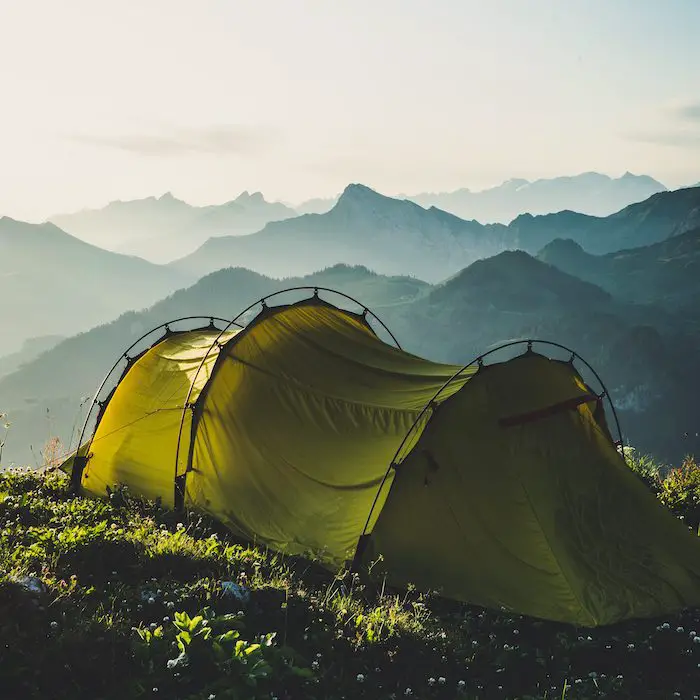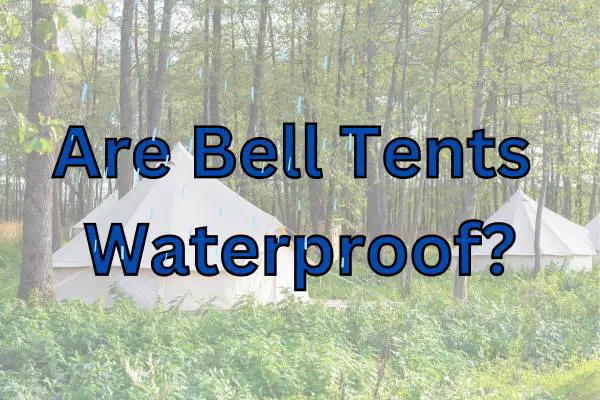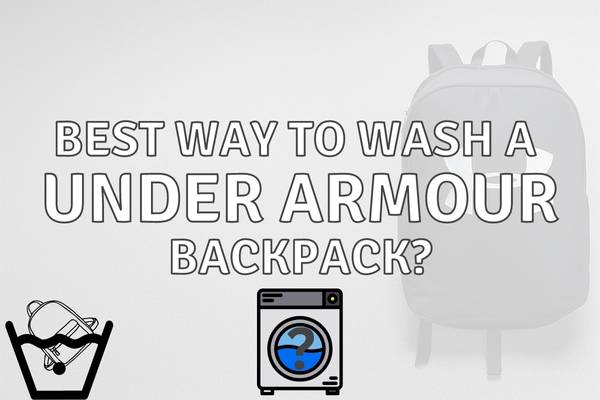Yes, Bell tents are generally waterproof, as they are made from durable and water-resistant materials like canvas or polyester treated with water repellent surface chemicals.
A Bell type canvas tent will usually be waterproof to a level of at least 3000 mm hydrostatic pressure and the PU floor material at least 10.000 mm, which is good enough for even heavy rain showers.
However, the level of waterproofing can vary depending on the quality of the tent and its fabric. To ensure your Bell tent remains waterproof, consider the following advice:
1. Choose a high-quality tent with a waterproof rating of at least 3000mm for the canvas or polyester material.
2. Look for tents with taped or sealed seams to prevent water ingress.
3. Apply a waterproofing treatment or spray to the tent fabric periodically to maintain its water resistance.
4. Ensure proper setup and tensioning of the tent to prevent water pooling on the surface.
5. Regularly inspect the tent for any signs of wear or damage that could compromise its waterproofing capabilities.
Remember that while Bell tents are designed to be waterproof, they may not withstand extreme weather conditions or heavy, prolonged rainfall without additional precautions.
This is an age-old question that many outdoor enthusiasts have asked themselves. If you’ve ever wanted to know the answer, read on!
As an experienced outdoorsman, I can confidently say that bell tents are in fact very water-resistant – and with a few simple precautions, they’ll keep you dry even when the weather takes a turn for the worse.
In this article, I’ll explain why bell tents are uniquely suited to wet conditions and provide some useful tips on how to make sure your tent keeps out the rain.
So if you’re looking for shelter from inclement weather, look no further than the humble bell tent – it might be just what you need!
Fabric Of Bell Tents
Ah, bell tents – the chosen tent of hobo kings and transient royalty. What’s not to love? The luxurious weave patterns, alluring waterproof coatings and inviting tarpaulin types make them an irresistible abode for adventurers everywhere!
Plus, with a few simple steps you can ensure your camping trips will be rain-free and ready for any wild weather that may come your way.
When it comes to treating your bell tent, there are many options available. Tent treatment sprays provide some short term protection from water but they must be reapplied regularly to maintain their effectiveness.
Seam sealing is another great option as this creates a durable waterproof seal along the seams of the fabric.
Finally, if you’re looking for something more permanent, then investing in high quality waterproof materials such as PU coated fabrics or breathable laminates should keep moisture out on even the wettest days.
Treatment Of Bell Tents
When it comes to treating bell tents, there are several things you should consider.
Stove safety is a priority – make sure your tent has been fitted with an appropriate chimney and that you know how to use it safely before bringing heat into the tent.
Ventilation is also important in keeping damp at bay; ensuring enough air can get inside while still maintaining warmth during colder months.
To keep your bell tent in top condition, store it away carefully when not in use, using breathable covers and somewhere dry and clean.
When winterizing a bell tent think about additional insulation for both heat retention and moisture prevention – investing in thermal liners or secondary layers of canvas will help protect from the elements.
The next step is looking at rain protection measures such as heavy duty waterproofing sprays or pitchproofs which can be applied to increase water repellence significantly.
Rain Protection
Having discussed how to care for your bell tent, it’s now time to turn our attention to rain protection. Rain is the most common and unpredictable of weather events, so waterproofing a bell tent will be instrumental in keeping you dry and comfortable during downpours.

To help ensure that your bell tent remains watertight, there are several materials, procedures and coatings available on the market.
- Invest in a quality canvas fabric with waterproofing qualities built into its fibers.
- Look into weatherproofing procedures like seam sealing or applying treatments such as canvas waxing to all parts of your tent exposed to moisture.
- Consider purchasing additional specialized products made specifically for tents such as specially designed sealants or sprays.
- Apply multiple coats of protective coatings over vulnerable areas such as seams and zippers for extra assurance against leaks.
Whether you’re looking for an impermeable shelter when camping in the great outdoors or just need something reliable for backyard use, equipping yourself with knowledge about waterproofing materials can go a long way towards prolonging the life of your beloved bell tent!
With this knowledge in tow, we’ll next move onto testing techniques that guarantee excellent results every time.
Testing Techniques
When it comes to weatherproofing, there are a few factors to consider when testing bell tents. Firstly, the design of the tent is important; It should be designed in such a way that rainwater can easily run off and not pool around the base of the tent.
Secondly, the quality and material used for construction will influence how waterproof it is. Ensure you purchase from a reputable brand and use water-resistant fabrics like canvas or polyester with PU coating.
Thirdly, look out for additional features such as taped seams on zips and vents which provide extra protection against moisture getting in.
Finally, check if your tent has any special coatings or treatments applied during manufacture to make it more impervious to water droplets entering through its fabric walls.
With these tips at hand, you’re sure to find an excellent waterproof bell tent suited to your needs!
Frequently Asked Questions
How Much Does A Bell Tent Cost?
Are you looking to take your camping experience up a notch with the ultimate in secluded, quality accommodation? Look no further than bell tents.
Whether you’re seeking freedom from the hustle and bustle of everyday life or want to be closer to nature for some peace and quiet, Bell Tents offer an ideal solution – plus they won’t break the bank!
In terms of cost, these versatile tents are very affordable considering how easy they are to set-up and pack away; however, there’s more to consider when purchasing such as climate protection, fabric quality and weather conditions so it pays off to do your research.
Is The Setup Of A Bell Tent Difficult?
Setting up a bell tent is easier than you think! With the right pitching tips and materials, it only takes about 15 minutes to assemble.
Plus, you’ll benefit from its insulation properties that help keep condensation issues at bay.
It’s definitely worth investing in the time and materials needed for setting up your bell tent – after all, nothing beats the freedom of being outdoors!
Can Bell Tents Be Used In Winter?
Setting up your bell tent for winter camping can be as easy as pie, but it’s important to note that not all tents are made equal when it comes to surviving the cold temperatures.
It’s like a game of chess – you have to think ahead and plan out how you’ll keep warm with proper insulation on the floor, temperature control in mind, and waterproofing tips at hand.
As an outdoor expert, I’d recommend considering camping safety first and foremost while also taking into account what materials will keep you comfortable through unpredictable weather conditions during winter months.
With these elements in place, your bell tent experience can give you the freedom and security you need for a successful adventure!
How Long Will A Bell Tent Last?
As an outdoor expert, I know that owning a bell tent is investing in something you can use for many years.
Bell tents are made of materials like cotton canvas and polycotton, which makes them relatively durable against the elements.
However, repairing tips such as re-waterproofing your tent every few years or using a ground cover underneath to protect from rocks and debris should be taken into consideration if you want your tent to last long term.
Winterizing it can also extend its life by allowing air circulation and preventing condensation build up inside the walls.
With these tips in mind, you’ll have no problem keeping your bell tent around for years to come!
Does A Bell Tent Provide Adequate Ventilation?
Bell tents provide excellent ventilation to ensure proper insulation and temperature regulation. The air movement provided by the tent helps prevent condensation buildup while also providing weatherproofing benefits.
As an outdoor expert, I can say that bell tents are one of the best investments you can make when it comes to comfort in any weather condition. With their ability to regulate temperature and keep out moisture, bell tents give you a sense of freedom outdoors that allows for days spent enjoying nature without worrying about being too hot or cold.
Conclusion
As an outdoor expert, I can confidently say that bell tents are a great option for camping in any season. Not only do they provide plenty of ventilation and space to move around, but their durability also means you won’t need to replace them anytime soon. Plus, the cost is often much lower than other tent types – on average, most bell tents range from $100-$400 depending on size and quality.
When it comes to waterproofing your bell tent, there are several options available. Many brands offer factory treated canvas or even rainflys which attach quickly and easily onto the tent frame. Additionally, investing in high-quality seam sealer and coatings will help keep moisture out while allowing your tent to breathe at the same time.
Finally, one interesting statistic worth noting is that if properly cared for over its lifetime, a good-quality Bell Tent can last up to 10 years! This makes them an incredibly economical choice as well as being ideal for all kinds of camping trips throughout the year.
So no matter what type of weather you may encounter during your next adventure – rest assured that with a Bell Tent you’ll be ready for whatever Mother Nature throws at you!





